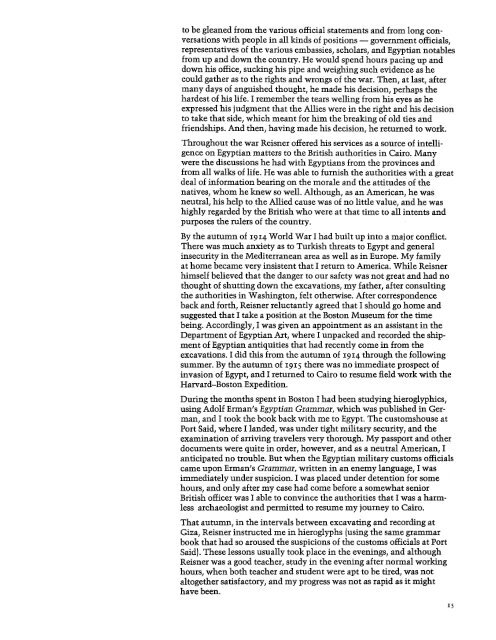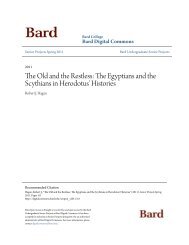Dows Dunham Recollections of an Egyptologist
Create successful ePaper yourself
Turn your PDF publications into a flip-book with our unique Google optimized e-Paper software.
to be gle<strong>an</strong>ed from the various <strong>of</strong>ficial statements <strong>an</strong>d from long conversations<br />
with people in all kinds <strong>of</strong> positions - government <strong>of</strong>ficials,<br />
representatives <strong>of</strong> the various embassies, scholars, <strong>an</strong>d Egypti<strong>an</strong> notables<br />
from up <strong>an</strong>d down the country. He would spend hours pacing up <strong>an</strong>d<br />
down his <strong>of</strong>fice, sucking his pipe <strong>an</strong>d weighing such evidence as he<br />
could gather as to the rights <strong>an</strong>d wrongs <strong>of</strong> the war. Then, at last, after<br />
m<strong>an</strong>y days <strong>of</strong> <strong>an</strong>guished thought, he made his decision, perhaps the<br />
hardest <strong>of</strong> his life. I remember the tears welling from his eyes as he<br />
expressed his judgment that the Allies were in the right <strong>an</strong>d his decision<br />
to take that side, which me<strong>an</strong>t for him the breaking <strong>of</strong> old ties <strong>an</strong>d<br />
friendships. And then, having made his decision, he returned to work.<br />
Throughout the war Reisner <strong>of</strong>fered his services as a source <strong>of</strong> intelligence<br />
on Egypti<strong>an</strong> matters to the British authorities in Cairo. M<strong>an</strong>y<br />
were the discussions he had with Egypti<strong>an</strong>s from the provinces <strong>an</strong>d<br />
from all walks <strong>of</strong> life. He was able to furnish the authorities with a great<br />
deal <strong>of</strong> information bearing on the morale <strong>an</strong>d the attitudes <strong>of</strong> the<br />
natives, whom he knew so well. Although, as <strong>an</strong> Americ<strong>an</strong>, he was<br />
neutral, his help to the Allied cause was <strong>of</strong> no little value, <strong>an</strong>d he was<br />
highly regarded by the British who were at that time to all intents <strong>an</strong>d<br />
purposes the rulers <strong>of</strong> the country.<br />
By the autumn <strong>of</strong> 1914 World War I had built up into a major conflict.<br />
There was much <strong>an</strong>xiety as to Turkish threats to Egypt <strong>an</strong>d general<br />
insecurity in the Mediterr<strong>an</strong>e<strong>an</strong> area as well as in Europe. My family<br />
at home became very insistent that I return to America. While Reisner<br />
himself believed that the d<strong>an</strong>ger to our safety was not great <strong>an</strong>d had no<br />
thought <strong>of</strong> shutting down the excavations, my father, after consulting<br />
the authorities in Washington, felt otherwise. After correspondence<br />
back <strong>an</strong>d forth, Reisner reluct<strong>an</strong>tly agreed that I should go home <strong>an</strong>d<br />
suggested that I take a position at the Boston Museum for the time<br />
being. Accordingly, I was given <strong>an</strong> appointment as <strong>an</strong> assist<strong>an</strong>t in the<br />
Department <strong>of</strong> Egypti<strong>an</strong> Art, where I unpacked <strong>an</strong>d recorded the shipment<br />
<strong>of</strong> Egypti<strong>an</strong> <strong>an</strong>tiquities that had recently come in from the<br />
excavations. I did this from the autumn <strong>of</strong> 1914 through the following<br />
summer. By the autumn <strong>of</strong> 1915 there was no immediate prospect <strong>of</strong><br />
invasion <strong>of</strong> Egypt, <strong>an</strong>d I returned to Cairo to resume field work with the<br />
Harvard-Boston Expedition.<br />
During the months spent in Boston I had been studying hieroglyphics,<br />
using Adolf Erm<strong>an</strong>’s Egypti<strong>an</strong> Grammar, which was published in Germ<strong>an</strong>,<br />
<strong>an</strong>d I took the book back with me to Egypt. The customshouse at<br />
Port Said, where I l<strong>an</strong>ded, was under tight military security, <strong>an</strong>d the<br />
examination <strong>of</strong> arriving travelers very thorough. My passport <strong>an</strong>d other<br />
documents were quite in order, however, <strong>an</strong>d as a neutral Americ<strong>an</strong>, I<br />
<strong>an</strong>ticipated no trouble. But when the Egypti<strong>an</strong> military customs <strong>of</strong>ficials<br />
came upon Erm<strong>an</strong>’s Grammar, written in <strong>an</strong> enemy l<strong>an</strong>guage, I was<br />
immediately under suspicion. I was placed under detention for some<br />
hours, <strong>an</strong>d only after my case had come before a somewhat senior<br />
British <strong>of</strong>ficer was I able to convince the authorities that I was a harmless<br />
archaeologist <strong>an</strong>d permitted to resume my journey to Cairo.<br />
That autumn, in the intervals between excavating <strong>an</strong>d recording at<br />
Giza, Reisner instructed me in hieroglyphs (using the same grammar<br />
book that had so aroused the suspicions <strong>of</strong> the customs <strong>of</strong>ficials at Port<br />
Said). These lessons usually took place in the evenings, <strong>an</strong>d although<br />
Reisner was a good teacher, study in the evening after normal working<br />
hours, when both teacher <strong>an</strong>d student were apt to be tired, was not<br />
altogether satisfactory, <strong>an</strong>d my progress was not as rapid as it might<br />
have been.<br />
15

















